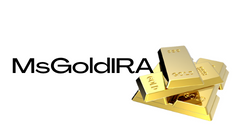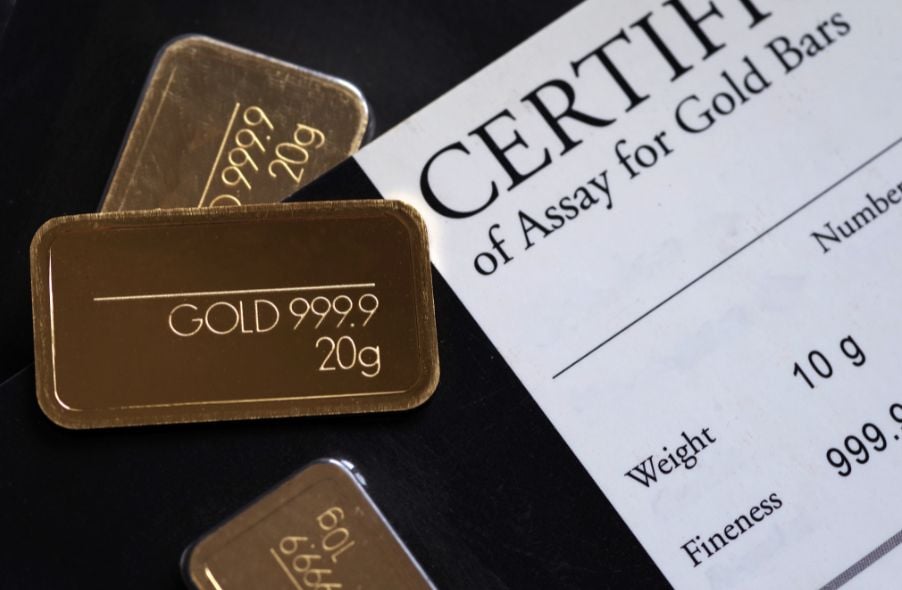Introduction
Many investors choose gold as a stable asset that has preserved its value throughout history. However, the logistics and costs of storing physical gold may deter some investors. In such cases, investing in paper gold can be a viable alternative. This article will explore what paper gold is, the different types of paper gold investments, the benefits and risks of investing in paper gold, and whether it is still worthwhile to invest in physical gold.
What is Paper Gold?
Paper gold refers to gold-backed assets that are tied to the spot price of gold but do not involve holding physical metal. It allows investors to tap into the advantages of owning gold without the added costs of delivery, storage, and insurance.
Types of Paper Gold Investment
The paper gold market offers various types of investments, including:
Gold Exchange-Traded Funds (ETFs)
Gold-backed ETFs function similarly to traditional stocks. The value of these assets rises or falls based on the price of physical gold. ETF shares can be easily bought and traded through brokers.
Physical Gold Certificates
Gold investment certificates allow investors to own physical gold without physically holding it. The tangible metal is stored in a physical vault, while the issuing authority takes care of storage and security. Nowadays, electronic gold trading has also become popular, where gold bullion can be purchased online and stored by the seller or traded on digital platforms.
Gold Futures Contracts
Gold futures involve an agreement to purchase a specific amount of physical gold at a predetermined price and time in the future. Investors do not take immediate possession of the metal but rather at a later date.
Commodity Pools Accounts
Commodity pools are funds that gather and invest capital from multiple individuals or entities. These funds are managed by professionals and offer higher liquidity and streamlined management.
Benefits of Using Paper Gold
Investing in paper gold offers several advantages over physical gold, including:
Flexibility
Investors can choose to invest any amount of money they desire in paper gold, whereas physical gold may require buying in bulk to make storage and delivery costs practical.
Liquidity
Paper gold investments can be easily converted into cash when market conditions are favorable. They can be traded via reputable stock exchanges or online platforms, ensuring quick and convenient transactions.
Lower Associated Costs
Investing in paper gold eliminates the need to pay for shipping, secure storage vaults, or insurance. The only additional cost would be the broker's commission, whereas storing and insuring physical gold can accumulate significant costs over time.
No Storage Concerns
Investors do not need to worry about the loss or theft of their precious metals when investing in paper gold.
Risks of Paper Gold Investment
Investing in paper gold also comes with certain risks, including:
Dependence on Third Parties
Investors depend on the financial institution or fund that issued their gold-backed securities. If the organization faces a crisis due to mismanagement or other reasons, it could jeopardize the investment.
Valuation Gaps
Price discrepancies can occur between the spot price of physical gold and gold-backed assets due to tracking errors, management fees, and other factors.
Market Volatility
Some gold-backed assets, such as gold futures, are more speculative in nature and may be more vulnerable to market ups and downs compared to physical gold.
No Physical Metal Ownership
Investors do not have the satisfaction and security of physically holding physical bullion when investing in paper gold.
Should You Invest in Physical Gold?
Despite the convenience of investing in paper gold, physical gold remains a valuable hedge investment for several reasons:
Ironclad Intrinsic Value
Physical gold has a stable intrinsic value that is less dependent on market trends or poor investment decisions compared to paper gold assets.
Stability
Gold has held its value for millennia and will continue to be a valuable commodity even in times of economic uncertainty.
Security
Physical gold is not vulnerable to hacking or cyber threats like digital assets.
Tradability
Physical gold can be easily exchanged for cash, making it a highly liquid asset even in extreme economic scenarios.
Factors to Consider
When choosing between paper gold and physical gold, it is important to consider the following factors:
Diversification
Diversifying your investment portfolio can help mitigate risks. Investing in both paper gold and physical gold allows you to benefit from the rise in value of gold-backed securities while preserving wealth during market crashes.
Investment Goals
Consider your investment goals and risk tolerance. If you have a substantial amount to invest and are willing to absorb potential losses, paper gold assets like ETFs or futures contracts may be suitable. However, consulting with an investment advisor is always recommended.
Hedge against Economic Crisis
If you are seeking the ultimate hedge investment that is immune to market shifts, physical gold may be more appealing. It can provide financial security during economic downturns and serve as a long-term investment for retirement or generational wealth.
Consider a Gold IRA
A Gold IRA combines the security of physical bullion with the convenience of paper gold. Since 1997, certain self-directed IRAs have allowed individuals to hold physical precious metals like gold, silver, and platinum. Gold IRAs gained popularity after the 2008 financial crisis, demonstrating the instability of stocks and paper assets.
Whether you choose paper gold or physical gold, it is essential to select an IRA partner that suits your needs. Conduct thorough research on past returns and associated management costs before making a decision.
Conclusion
Investing in paper gold offers flexibility, liquidity, and lower associated costs compared to physical gold. However, it also comes with risks such as dependence on third parties and valuation gaps. Physical gold provides stability, security, and tradability but involves markup prices, storage and insurance costs, and slower liquidity. Ultimately, the choice between paper gold and physical gold depends on individual investment goals and risk tolerance. Consider diversifying your portfolio and consult with an investment advisor before making any significant investment decisions.
Frequently Asked Questions
What is the best precious metal to invest in?
The investment of gold is high-returning and has high capital appreciation. It protects against inflation, as well as other risks. As people worry about inflation, the price of gold tends increase.
Gold futures are a great idea. These contracts guarantee that you will receive certain amounts of gold at a given price.
However, futures on gold aren't for everyone. Some prefer physical gold.
They can easily exchange their gold with other people. They can also make a profit by selling their gold at any time they desire.
Some people want to avoid paying tax on their gold. People buy gold directly from the government in order to avoid paying taxes.
This will require several trips to your local Post Office. First convert any gold that is already in circulation into coins or bars.
Then you will need a stamp to attach the coins or bars. Then, send them to the US Mint. There they will melt the coins or bars into new ones.
These new bars and coins have the original stamps stamped on them. These new coins and bars are legal tender.
However, if you purchase gold directly from the US Mint you won't be required to pay any taxes.
What precious metal would your investment preference be?
What is the interest rate on a gold IRA?
It all depends upon how much money you invest. If you have $100,000 to spare, then yes. If your assets are less than $100,000, it is no.
The amount of money you put into an IRA determines whether or not it earns interest.
If you have more than $100,000 in retirement savings each year, you might consider opening a regular brokerage accounts.
While you may earn more interest there than elsewhere, you are also exposed to more risky investments. If the stock market crashes you don't wish to lose your entire investment.
A IRA will be more beneficial if you can only contribute $100,000 annually. At least until the market starts growing again.
Can I add gold to my IRA?
Yes, it is possible! Gold can be added to your retirement plan. Gold is a great investment as it doesn't lose money over time. It is also immune to inflation. You don't even have to pay taxes.
You need to understand that gold is not like other investments before you invest in it. You cannot buy shares of companies that are gold, like stocks and bonds. They can't be sold.
Instead, you must convert your gold to cash. This means that it will be necessary to dispose of the gold. You cannot keep it.
This makes gold an attractive investment. You can always sell other investments later. That's not true with gold.
Even worse, you can't use the gold as collateral for loans. To cover a mortgage, you may need to give up some gold.
So what does this mean? You can't keep your gold indefinitely. You'll have to turn it into cash at some point.
There's no need to be concerned about this right now. To open an IRA, all you need is to create one. Then, you can invest in gold.
What type of IRA is best?
When choosing an IRA, it is important to choose one that suits your lifestyle and goals. You should consider whether you wish to maximize tax deferred growth, minimize taxes now, pay penalties later or avoid taxes altogether.
The Roth option may make sense if you are saving for retirement but don't have much other money invested. It's also worth considering if your plan is to work after the age of 59 1/2.
If you plan to retire early, the traditional IRA might make more sense because you'll likely owe taxes on the earnings of those funds. However, if your goal is to retire early, the traditional IRA might be more sensible. The Roth IRA allows you to withdraw some of your earnings or all without paying taxes.
Which is more powerful: sterling silver or 14k gold?
Both gold and silver make strong metals. Sterling silver is more affordable than sterling silver which has only 24% pure silver.
Sterling silver is also known as fine silver because it is made from a mixture of silver and other metals such as copper and zinc.
It is generally believed that gold is very strong. It is very difficult to separate it from its metal counterpart. It would be much easier to break it apart if you dropped an object on top a piece gold.
On the other hand, silver is not nearly as strong as gold. If you dropped an item onto silver sheets, it would likely fold and bend without cracking.
Silver is often used to make jewelry and coins. Its value fluctuates based on demand and supply.
How do I choose an IRA?
Understanding your account type is the first step in finding the right IRA for you. This includes whether you are looking for a traditional IRA or Roth IRA. Also, you should know how much money is available for investment.
Next, you need to determine which provider is best suited for your needs. While some providers offer both accounts, others specialize in only one.
The fees associated with each option should be considered. Fees can vary greatly between providers, and may include annual maintenance charges and other fees. Some providers charge a monthly fee depending on how many shares you have. Others charge only once per quarter.
Statistics
- To qualify as IRA allowable precious metals and be accepted by STRATA, the following minimum fineness requirements must be met: Gold must be 99.5% pure, silver must be 99.9% pure, and platinum and palladium must both be 99.95% pure. (stratatrust.com)
- The IRS also allows American Eagle coins, even though they do not meet gold's 99.5% purity standard. (forbes.com)
- If you accidentally make an improper transaction, the IRS will disallow it and count it as a withdrawal so that you would owe income tax on the item's value and, if you are younger than 59 ½, an additional 10% early withdrawal penalty. (forbes.com)
- The maximum yearly contribution to an individual's IRAs is currently $6,000 ($7,000 for those 50 years or older), or 100% of earned income, whichever is less. (monex.com)
External Links
regalassets.com
takemetothesite.com
wsj.com
forbes.com
- Gold IRA – Add Sparkle to Your Retirement Nest Egg
- Understanding China's Evergrande Crisis – Forbes Advisor
How To
Things to Remember About the 2022 Best Precious Metals Ira
Precious Metals Ira has become a popular choice for investors. This article will explain what makes precious metals Ira so appealing and how you can make smart decisions when investing in them.
Their long-term growth potential is the main draw of these assets. If we look at historical data, gold prices show incredible returns. Gold prices have increased by almost $1900 per troy ounce in the past 200 year, from $20 an ounce to nearly $1900 over that time. The S&P 500 Index grew only by about 50%.
In times of economic uncertainty, gold is often considered a safe haven. People will sell stocks to move to safety and security in gold when the stock exchange is experiencing a downturn. As an inflation hedge, gold is also thought to be a good investment. Many economists believe that there will always exist some level of inflation. Accordingly, many economists believe that inflation will always be present. Therefore, physical gold can be considered a way for you to safeguard your savings from future price rises.
You should be careful before you purchase precious metals such as palladium, gold, platinum or silver. First, you should know whether you want to invest in bullion bars or coins. Bullion bars are often purchased in large quantities (like 100 grams) and stored until needed. Bullion bars are often replaced by coins, which can be used to buy smaller amounts of bullion.
The second is to think about where you intend to store precious metals. Some countries are safer than others. It might make sense to store precious metals in another country if you reside in the US. If you intend to store them in Switzerland, though, you might need to question why.
Finally, you should decide whether you want to invest directly in precious metals or through “precious metals exchange-traded funds” (ETFs). ETFs track the performance of various commodities such as gold and are financial instruments. These instruments can be used to expose you to precious metals without needing to own them.
—————————————————————————————————————————————————————————————-
By: Learn About Gold
Title: Investing in Paper Gold vs. Physical Gold: Which is Right for You?
Sourced From: learnaboutgold.com/blog/paper-gold/
Published Date: Wed, 10 Jan 2024 23:00:55 +0000











